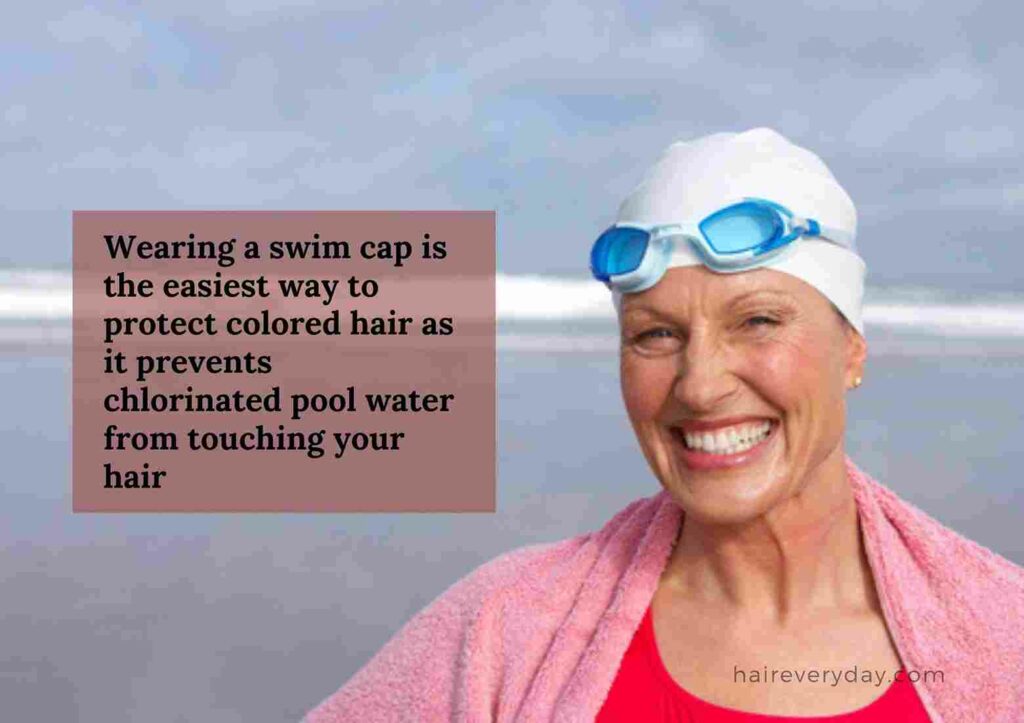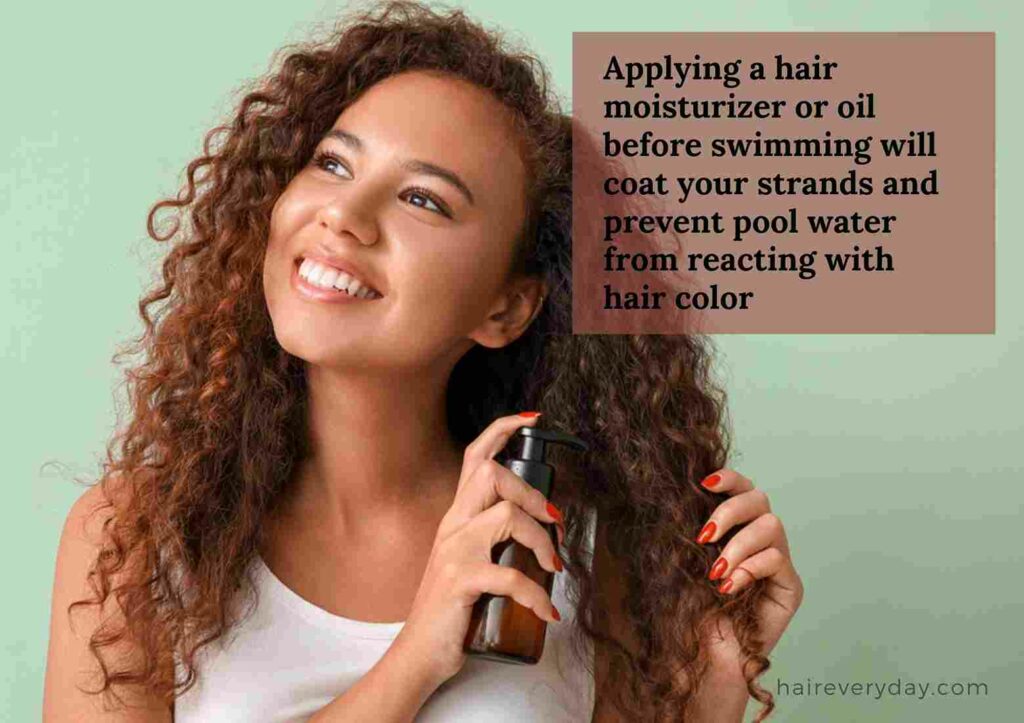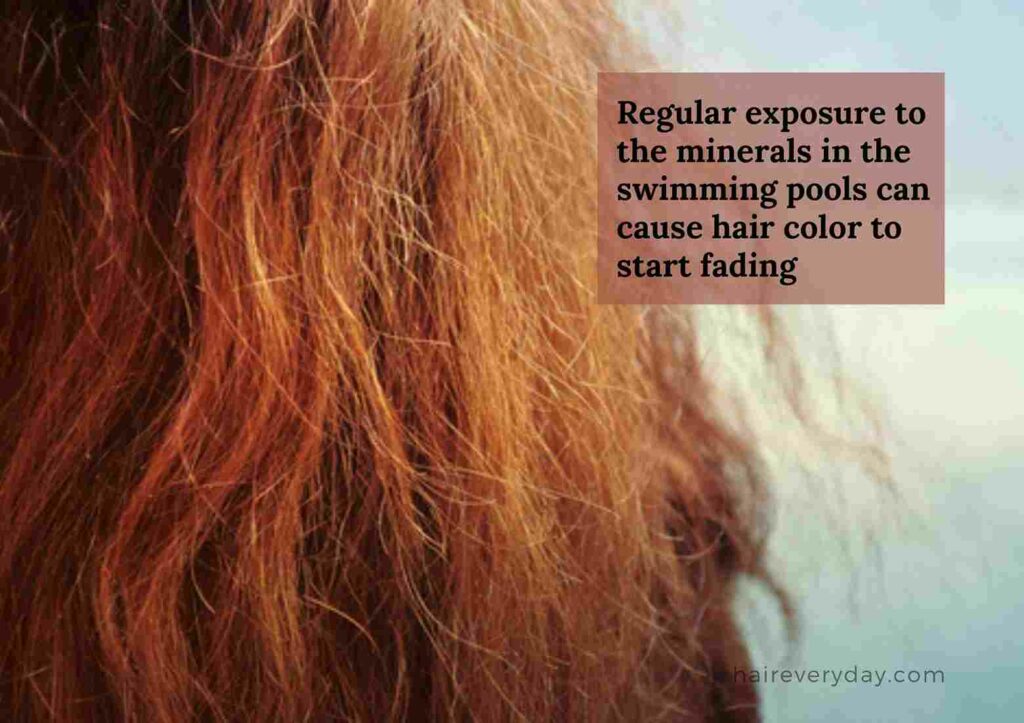Learn how to protect color treated hair while swimming with these easy tips. Also find out if a swim cap will protect hair against damage by chlorine.
In This Article:
-
How to Protect Color Treated Hair While Swimming
- 1. Always wear a swim cap
- 2. Remember the pre and post pool rinse
- 3. Use a leave-in conditioner before hitting the pool
- 4. Wash your hair with a swimmer shampoo
- 5. Consider oiling your hair
- 6. Condition your hair with a color-protectant conditioner
- 7. Use a shampoo that can clarify your hair
- 8. Use a sunscreen hair spray before you go for a swim
- How does swimming pool water affect color-treated hair?
- Frequently Asked Questions
- Why You Should Trust Haireveryday?
Are you someone who loves to enjoy a swim often, but have recently got your hair colored and are apprehensive about whether or not the chlorinated pool water is the best thing for your locs right now?
Chlorinated water can be the biggest enemy to those with color-treated hair because it can make your color fade much earlier than expected, can make blonde hair get a greenish tinge and more so, can cause hair damage.
So if you are in a predicament and still want to go for a swim, but save your color-treated hair at the same time, this is the perfect read for you!
This article will let you in on all the possible ways you can protect your color-treated hair, so go ahead and check it out.
How to Protect Color Treated Hair While Swimming

1. Always wear a swim cap
Wearing a swim cap is always recommended when you go for a swim, irrespective of your hair type, length or color-treatment.
While swim caps aren’t completely foolproof in terms of damage to the hair, it can at least help prevent hair damage to a large extent.
They also prevent too much of the chlorinated water from touching the hair and damaging the hair color. (Gloor, M, and H Kellermann. “Uber den Einfluss der Chlorierung des Wassers auf die Kopfhaut-und Haarlipide” [Influence of water chlorination on the skin of the head and hair lipids]. Zeitschrift fur Hautkrankheiten vol. 52,12 (1977): 668-72.)
It is essential to make sure that whether your hair is short or long (tie it up into a bun, before tucking it in), it should be well tucked into the cap. Make sure to buy a cap that fits your head perfectly in a snug fit.
2. Remember the pre and post pool rinse
The pre and post pool rinses are extremely important when you decide to go for a swim.
Swimming pool water has chlorine and therefore, rinsing your hair with regular water before entering into the pool will make the hair soak up a lot of water.
How this benefits the hair is, when you then get into the pool, the hair is already soaked with water and will thereby reduce the quantity of chlorinated water that can enter into the hair strand and cause it to get damaged.
While on the other hand, rinsing your hair with regular water once you come out of the pool is beneficial to your hair because the chlorinated water that may not have entered deep into the hair strand, can still stick to the hair strand or coat it.
Therefore, rinsing your hair under running water will help get rid of most of the fresh chlorine buildup from your hair strands.

3. Use a leave-in conditioner before hitting the pool
There are many hair product brands that cater to the needs of swimmers hair and have come out with good leave-in conditioners that you can use on your hair before you go before a swim.
These leave-in conditioners can help keep the chlorinated water from entering into the hair shaft by acting like a barrier.
So applying a leave-in conditioner before going for a swim will also have the same effect on your color-treated hair and protect the color from fading.
4. Wash your hair with a swimmer shampoo
If you are someone who swims on a regular basis, then you can buy a shampoo that is specifically designed for swimmers.
These shampoos are meant to help get rid of chlorine buildup from the hair, while also helping the hair regain its lost moisture and also keeping the hair hydrated.
Using a swimmer’s shampoo will also help protect color-treated hair and help keep the hair soft, smooth and free from external damage.

5. Consider oiling your hair
Most often swimmers apply coconut oil (or you can use any other carrier oil of your choice) on their hair before going for a swim.
When the hair strands get coated with the oil, it will make it harder for the water to penetrate into the hair shaft because the oil creates a barrier between the chlorine and the hair strand itself.
So oiling your color-treated hair before getting into the pool can be a great way to protect your hair color from damage and fading.
6. Condition your hair with a color-protectant conditioner
In the present day, there are hair products to treat almost all our hair problems.
Well, there are also color-protection conditioners that can be used after a swim to help retain the hair color and restore the lost hydration from the hair.
7. Use a shampoo that can clarify your hair
Pool water has not just chlorine, but also copper and minerals that come from any source of water, which is usually unavoidable unless the pool water is filtered before the pool gets filled.
When this water comes in contact with our hair, it can alter the color because of the chemical and mineral buildup on the hair strands.
By using a clarifying shampoo, it can break through the layers of the buildup and cleanse the hair, without interfering with the hair color.
But it is important to note that clarifying shampoos are very harsh on the hair and can cause extensive hair damage.
So using it just once in a month is recommended, with deep conditioning the hair after it has been used.
8. Use a sunscreen hair spray before you go for a swim
I’m sure there are a lot of you out there who may not have heard about sunscreen for the hair. Well, it is actually a thing and a very useful one!
Sunscreens for the hair come in the form of serums and hair sprays. So they are easy to put on your hair before you go for a swim (if you’re swimming in an outdoor pool).
When your hair gets mixed with the chlorinated water in the pool and is also exposed to sunlight, there can be a drastic fading of the hair color.
So when there is sunscreen on the hair (make sure to buy one which is a minimum of SPF 30), it will protect the hair from the UV rays of the sun, while also acting as a hair barrier against the chlorinated pool water.

How does swimming pool water affect color-treated hair?
1. Causes hair color to fade
Swimming pools often use high amounts of chlorine, as it’s a chemical that can help maintain the cleanliness of the water and get rid of germs.
If your hair has been colored and it gets exposed to the chlorine in the water when you go for a swim, the chlorine can make the color fade away over time.
This is because the chlorine comes in contact with the hair color and forms a bond, drawing out the color eventually.
2. Can cause green pool hair
If you are someone who has dyed your hair blonde or any other lighter color shade, then pool water can only spell disaster, when it comes to your hair.
I’m sure there are many blondes who might have experienced green pool hair, where light colored hair tends to get a greenish hue after going for a swim.

Well, this is because the chlorine in pool water, combines with the copper in the water (which is a mineral found in all sources of water) and interact with each other forming a bond that can eventually stick to the hair and make it turn green.
This happens on all hair colors and hair types, but of course the green color only shows on lighter hair and not darker hair shades.
3. Makes hair dry, damaged and brittle
When the hair is color-treated it has to go through the process of bleaching and dyeing your hair to a particular color shade.
During this process, the hair already experiences a certain amount of hair damage, making the hair more prone and susceptible to damage in future.
When you go for a swim, your already damaged hair can get further damaged because of the chlorine in water. This will make the hair become dry, brittle and can lead to hair breakage in the long run.
Frequently Asked Questions
1. Is green pool hair reversible?
While green pool hair is reversible, it is recommended that people with lighter hair colors, find ways to protect their hair from turning green, before going for a swim.
2. Will a chelating shampoo help remove chlorine buildup from color-treated hair?
Why You Should Trust Haireveryday?
The author of this article, Leah Marie Priest has a degree in Cosmetology with years of experience in dealing with hair care, scalp care, and hairstyling. As someone who extensively deals with all kinds of hair textures, products, styling methods and more, hair Leah Marie knows what kind of products and procedures suit each hair type and person. We have also tested these hair products and processes ourselves to provide you an unbiased review about every product. Each of our articles are also reviewed by a team of medical professionals so that you get the most accurate and expert-reviewed information.
The final takeaway
For those with color-treated hair, you will definitely need to be extra-precautious when you decide to “take a dip” in the pool.
Well, since chlorinated water is not the best for your color-treated locs, you will have to make sure you prep your hair well before you get into the pool, while also giving your hair additional care once you finish your swim.
If you are someone who goes for a swim very often, then you will have to be rather diligent in following the right hair care methods for color-treated hair.
Otherwise, frequent salon color touch ups can otherwise become a rather expensive affair!
Also Read:
Can I Use Color Safe Shampoo On Uncolored Hair
Is Lake Water Bad For Your Hair
Are Shampoo Bars Safe For Color Treated Hair

